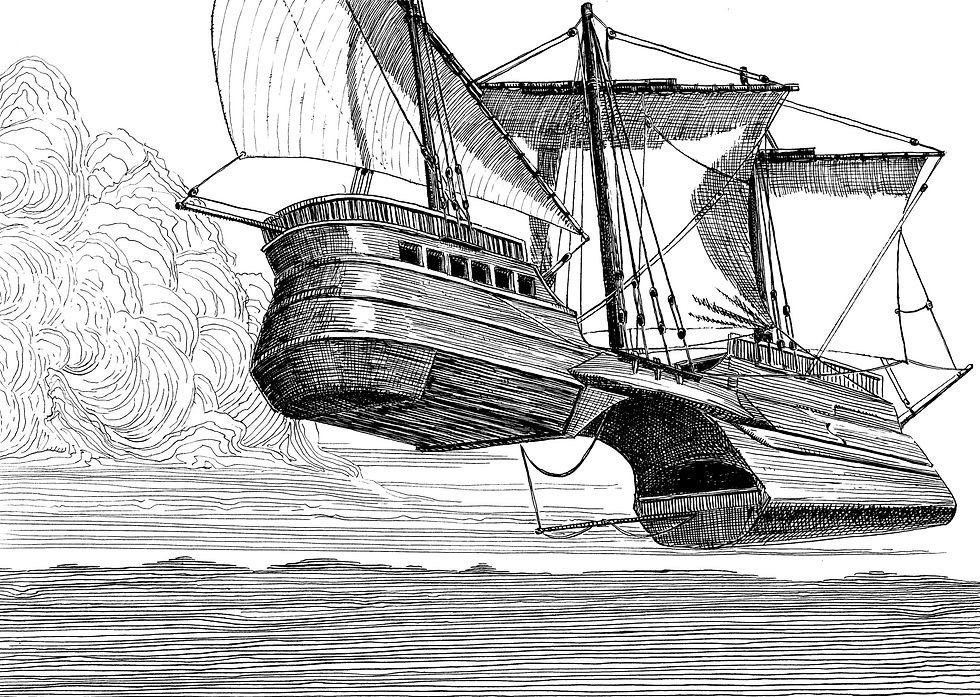Q&A: 'Space 1889' and gaslight-era adventures on Venus
- Brian Woodman Jr.
- Sep 9, 2017
- 3 min read
Holmesian Musings and Ripping Yarns

We recently spoke with Uli Lindner of Clockwork Publishing about the company's edition of the classic tabletop role-playing game 'Space 1889' and its latest supplement -- 'Venus.'
Q: When was Space: 1889 first published and how many editions have been released? A: The original edition was published in 1988 by Game Designers Workshops, and there has been a re-release in the early 2000s by Heliograph Press. There has also been a adapted version for Savage Worlds called "Red Sands". But our Space: 1889 is basically the "regular" second edition of the game. Q: Could you tell us about the publication history of the current edition? A: The German edition of the Ubiquity version was first released in 2011, with various supplements and adventures following over the years. In 2013, Clockwork Publishing started a kick-starter campaign to fund an English version of the game, originally cooperating with British publisher Chronical City, although the two have separated ties since then and Clockwork now works alone (with Modiphius as a publishing partner). The campaign got successfully funded, and until now there have been several publications of translations of the German edition as well as some completely new material. We are planning to continue translation of German material as well as producing completely new material directly in English.

Q: How many supplements are currently out for the game? A: Besides the Core Rule Book, there is a Game Master's Screen available (including a booklet containing various generic NPC stats), as well as a source book on Martian creatures and technology, called "Marvels of Mars", and one adventure, "The Strange Land" by Gareth Hanrahan. And of course, the Venus supplement which has just been released. The adventure "London Bridge has Fallen Down" by Kieran Turley will be released in September. Several more adventures and the source book for Mercury have been released as PDF and will follow in print during the next months. There are many more adventures and a Mars source book available in German - those will of course also be translated at a later point.
Q: When was the Venus source book released?
A: This weekend, (Editorial note: Geeksagogo.com interviewed Lindner on Aug. 22) although the PDF version has been available on drivethrurpg for a while now.

Q: What does Venus offer players as opposed to the Martian setting? A: In three words: Jungles, Lizard-men, and dinosaurs. In the "Spaceverse," Venus is a much younger planet than both Mars and Earth, meaning that its inhabitants, the Lizard-men are a much less-developed civilization in technological terms. Most parts of the Morning Star are either covered in thick, impenetrable jungle or by oceans, so there is yet a lot to discover. Colonization isn't as advanced as on Mars, and the few human settlements mainly consist of daring adventurers and soldiers-of-fortune who try to start a new life in the wilderness, fending off T-Rexes and Velociraptors and exploiting the natural riches of Venus - for the jungles are home to lots of exotic plants that can be processed into potent chemicals and pharmaceuticals.
Q: Could you describe the game mechanics? A: Space: 1889 uses the Ubiquity system, a quick and easy to learn pool dice system that is also used in games like Hollow Earth Expedition, Desolation or All for One. The game master determines the Difficulty Rating of an action, which the player must then exceed with his roll. The combined rating of a Skill and an Attribute determines the number of dice which can be used to resolve the action’s Difficulty, the dice pool. Players can use any dice available, with even numbers counting as successes. To avoid time-consuming dice rolling orgies you can also Take the Average, which is half of your character’s Rating, to get an automatic success. For example, if a player’s character has a Larceny rating of 6 and the game master sets the Difficulty of the task at 3 successes, the player may Take the Average to automatically succeed without rolling any dice. Talents allow for special actions, such as drawing a weapon more quickly, providing allies with skill bonuses, or even entrancing a target during combat so that they lose interest in attacking. Style points enhancements can buy bonus dice, boost Talents, and reduce damage.
Q: Who worked on the game? A: Originally, Space: 1889 was created by Frank Chadwick. This new edition was created under the direction of German RPG author and editor-in-chief Stefan Küppers, with various German authors in his team. Most of the adventures published for the English version are written by American or British authors, like Gareth Hanrahan, Kieran Turley, John Snead, or Steve Long.











Komentáře